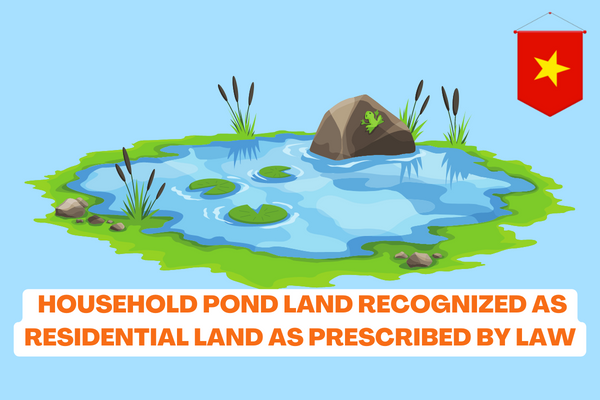Vietnam: Is household pond land recognized as residential land as prescribed by law? Can pond land purchased and sold without a land use right certificate be transferred?
Is household pond land recognized as residential land as prescribed by Vietnamese law?
Pursuant to Article 103 of the 2013 Land Law, the determination of residential land area in case there are gardens and ponds as follows:
Article 103. Determination of residential land area with respect to land with ponds and gardens
1. In order to be considered as residential land with gardens and ponds of households or individuals must be located within a land parcel with existing houses.
2. If a land parcel with gardens and ponds was formed before December 18, 1980, and the land user possesses one of the documents on land use rights as prescribed in Clauses 1, 2 and 3, Article 100 of this Law, the area of residential land shall be determined in accordance with such documents.
In case the residential area is not indicated clearly in documents on land use rights prescribed in Clauses 1, 2 and 3 of Article 100 of this Law, the residential land area to be recognized without land use levy must not exceed 5 times the land allocation quota prescribed in Clause 2, Article 143, and Clause 4, Article 144 of this Law.
…
Accordingly, a household pond land is recognized as residential land if the plot is located in the same parcel as the land whose houses in the residential area are recognized as residential land.

Vietnam: Is household pond land recognized as residential land as prescribed by law? Can pond land purchased and sold without a land use right certificate be transferred?
Pond land of households without land use right certificates can land use rights be transferred in Vietnam?
Pursuant to Article 188 of the 2013 Land Law, conditions for transfer of land use rights are as follows:
Article 188. Conditions for the exercise of the rights to exchange, transfer, lease, sublease, inherit, donate or mortgage land use rights; to contribute land use rights as capital
1. Land users may exercise the rights to exchange, transfer, lease, sublease, inherit, donate or mortgage land use rights and contribute land use rights as capital when meeting the following conditions:
a/ Having the certificate, except the case prescribed in Clause 3, Article 186 and the case of receiving inheritance prescribed in Clause 1, Article 168 of this Law;
b/ The land is dispute-free;
c/ The land use rights are not distrained to secure judgment enforcement;
d/ Within the land use term.
…
Thus, one of the conditions for the transfer of land use rights is that land must have a land use right certificate.
In this case, if you buy land for people without certificates and only buy and sell with handwritten papers, this land use right transfer contract has no legal validity.
In order to make the transfer, he must request the people to carry out the procedures for issuing land use right certificates, after which the two parties sign a contract for the transfer of land use rights (the transfer contract must be notarized and authenticated according to the provisions of Clause 3, Article 167 of the 2013 Land Law).
Next, he carried out the procedure of registering land fluctuations at the Land Registration Office (to the name of the red book). Regarding the dossier of the implementation of earthquake registration procedures, please see Clause 1 Article 2 of Circular 09/2021/TT-BTNMT.
Are individuals allowed to fill ponds on their own land in Vietnam?
Pursuant to Clause 7, Article 60 of the 2012 Law on Water Resources provides for the prevention and control of drought, flood, flood and artificial waterlogging as follows:
Article 60. Prevention of, combat against droughts, floods, artificial waterlogging
…
7. For prevention of, combat against waterlogging and protection of water sources, lakes, ponds, lagoons are not leveling.
The provincial People’s Committees publish list of lakes, ponds, lagoons are not levellng in local scope.
The Ministry of Natural Resources and Environment publishes list of lakes, ponds, lagoons are not levellng in areas of two or more central-affiliated cities and provinces.
In addition, Article 252 of the Civil Code 2015 provides for the right to supply and drain water through adjacent real estate as follows:
Article 252. Rights relating to supply and drainage of water through adjoining immoveable property
Where, due to the natural location of immoveable property, the supply and drainage of water must pass through another immoveable property, the owner of the immoveable property through which the water flows must provide an appropriate channel for the supply and drainage of water and may not hinder or prevent the flow of water.
The person using the water supply and drainage channel must minimize to the lowest possible extent any damage to the owner of the immoveable property through which the water flows when installing the water channel. If damage is caused, compensation must be made. Where water flows naturally from a higher position to a lower position and causes damage to the owner of the property through which the water flows, the person using the water supply and drainage channel shall not be liable to compensate for any damage.
Accordingly, if his pond land is not in the case of not being leveled according to the provisions of Article 60 of the Law on Water Resources 2012, he has the right to level.
If due to their natural location, those households have no other way to drain water, it is mandatory to drain sewage through his land, then he must reserve a sewage drainage for these households.
In this case, you should discuss with these households and individuals to find a solution, if you still do not find a solution, you can contact the Department of Natural Resources and Environment to discuss more.
LawNet
